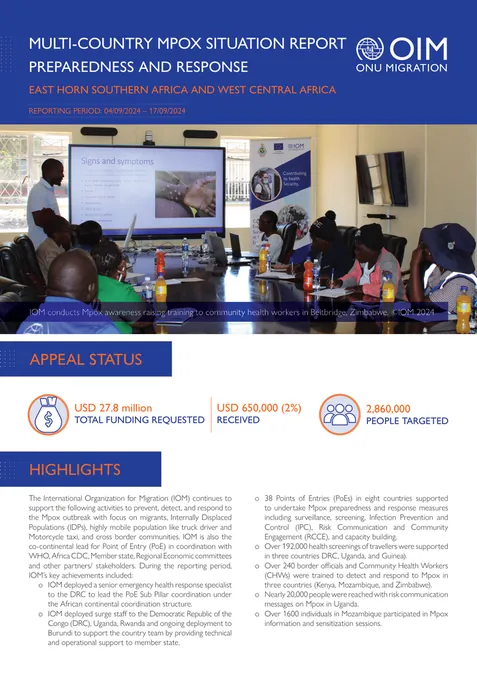
Mpox Outbreak Update: IOM's Ongoing Efforts in the Democratic Republic of the Congo
2024-09-26
Mpox Outbreak Update: IOM's Ongoing Efforts in the Democratic Republic of the Congo
In a proactive response to the Mpox outbreak, the International Organization for Migration (IOM) is ramping up efforts to tackle the infectious disease within vulnerable populations in the Democratic Republic of the Congo (DRC). This crucial initiative, running from September 4 to September 17, 2024, focuses particularly on migrants, Internally Displaced Persons (IDPs), and mobile groups such as truck drivers and motorcycle taxi operators.
Key Developments
During this reporting period, the IOM made significant strides in its healthcare response, working in close collaboration with the World Health Organization (WHO), the Africa Centers for Disease Control and Prevention (Africa CDC), and various governmental and regional partners. Here are some of the notable achievements:
- **Leadership Deployment**: A senior emergency health response specialist has been deployed to the DRC to head the Point of Entry Sub Pillar coordination as part of the African continental efforts to manage the outbreak.
- **Surge Support**: Additional surge staff have been sent to not only the DRC but also neighboring countries including Uganda, Rwanda, and Burundi, providing essential technical and operational assistance to local teams.
- **Strengthening Borders**: A total of 38 Points of Entry (PoEs) across eight nations have been bolstered to implement Mpox preparedness and response strategies. These strategies encompass critical areas like surveillance, screening, infection prevention, risk communication, and community engagement.
- **Health Screenings**: The IOM facilitated over 192,000 health screenings for travelers in the DRC, Uganda, and Guinea, ensuring that symptoms are identified and managed promptly.
- **Training Initiatives**: Over 240 border officials and Community Health Workers (CHWs) have received specialized training aimed at enhancing their capabilities to detect and respond to potential Mpox cases in Kenya, Mozambique, and Zimbabwe.
- **Community Outreach**: Nearly 20,000 individuals in Uganda have been educated about Mpox through targeted risk communication efforts. In Mozambique, more than 1,600 people participated in information and sensitization sessions.
Conclusion
As the Mpox outbreak continues to pose significant health risks in the region, the IOM's comprehensive approach aims to fortify health systems and community resilience. The organization’s ongoing commitment to enhancing preparedness and response across various borders is critical as countries work together to prevent further spread of the disease.
Stay tuned for more updates as the situation evolves and more measures are implemented to safeguard public health across the region.





 Brasil (PT)
Brasil (PT)
 Canada (EN)
Canada (EN)
 Chile (ES)
Chile (ES)
 España (ES)
España (ES)
 France (FR)
France (FR)
 Hong Kong (EN)
Hong Kong (EN)
 Italia (IT)
Italia (IT)
 日本 (JA)
日本 (JA)
 Magyarország (HU)
Magyarország (HU)
 Norge (NO)
Norge (NO)
 Polska (PL)
Polska (PL)
 Schweiz (DE)
Schweiz (DE)
 Singapore (EN)
Singapore (EN)
 Sverige (SV)
Sverige (SV)
 Suomi (FI)
Suomi (FI)
 Türkiye (TR)
Türkiye (TR)